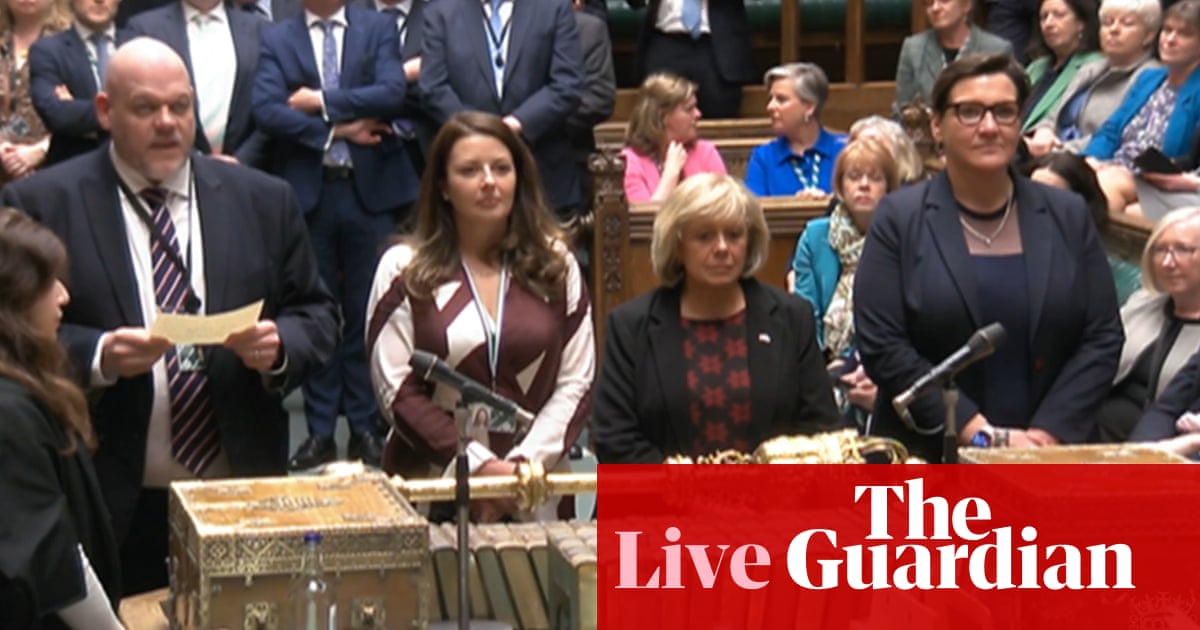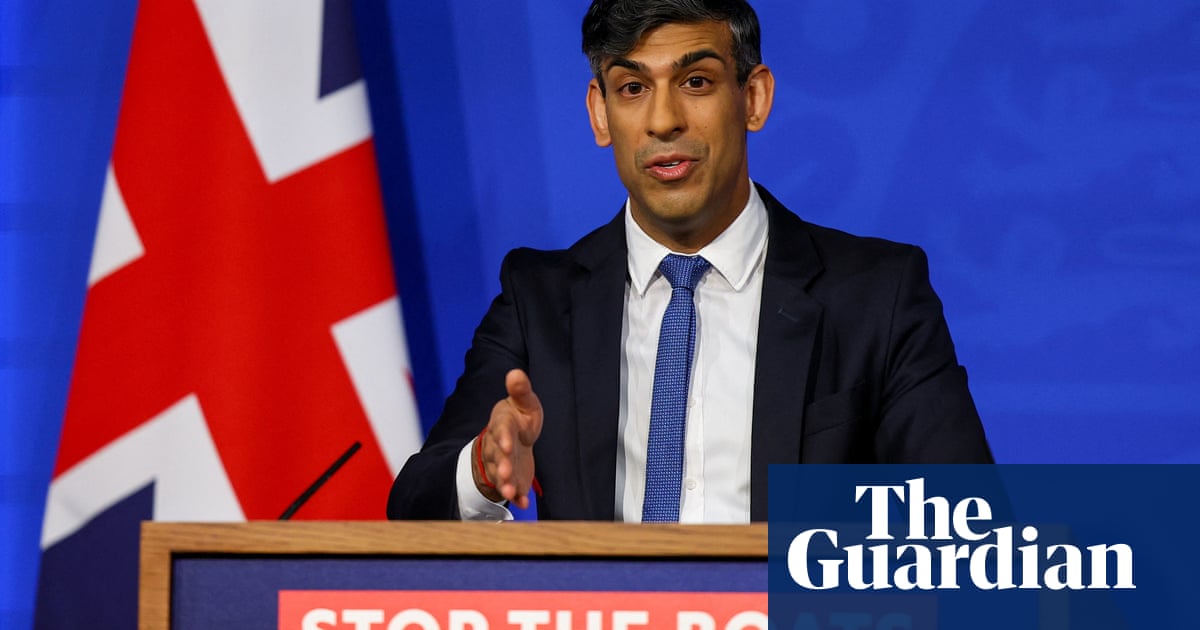
Rwanda bill close to becoming law after peers abandon final battle, over monitoring committee safety amendment
The Lords will start debating the Rwanda bill at 11.45pm, we’re told (not 11.15am, as I suggested earlier).
It looks as though the government has now won. According to sources in the Lords, peers will not vote against the bill again, and they will not try to reinsert the Lord Hope amendment giving the independent monitoring committee a role in declaring Rwanda safe.
That means, after a short debate, the bill should have finished its passage through parliament. It will not have to return to the Commons.
It should then get royal assent very soon, probably on Tuesday.
Early morning summary
Rishi Sunak’s Rwanda deportation bill will become law after opposition and crossbench peers backed down, opening the way for legal battles over the potential removal of dozens of people seeking asylum. After a marathon battle of “ping pong” over the key legislation between the Commons and the Lords, the bill finally passed when opposition and crossbench peers gave way on Monday night. The bill is expected to be granted royal assent on Tuesday. Home Office sources said they have already identified a group of asylum seekers with weak legal claims to remain in the UK who will be part of the first tranche to be sent to east Africa in July. In a message posted on X shortly after the bill cleared the Lords, James Cleverly, the home secretary, said this was “a landmark moment” in the government’s plan to stop the boats.
But charities representing asylum seekers restated their opposition to the plan. The Refugee Council said this was Orwellian legislation that would “simply exacerbate the chaos in the asylum system at huge cost to the taxpayer”.
And the Joint Council for the Welfare of Immigrants said the bill was shameful.
Labour describes Rwanda bill as "eye-wateringly expensive election stunt" after it clears parliament
Labour has issued a statement describing the Rwanda bill as an “eye-wateringly expensive election stunt”. Yvette Cooper, the shadow home secretary, said:
The new Rwanda law is an extortionately expensive gimmick rather than a serious plan to tackle dangerous boat crossings.
The Rwanda scheme will cost more than half a billion pounds for just 300 people, less than one per cent of asylum seekers here in the UK - and there is no plan for the 99% …
The Conservatives should drop this eye-wateringly expensive election stunt and instead adopt Labour’s practical plan boost our border security with new cross-border police and new counter terror style powers to crack down on the criminal gangs, and a new Returns and Enforcement Unit to remove those who have no right to be here.
Rwanda bill clears parliament
Lord Sharpe of Epsom, the Home Office minister, concluded the debate by arguing that it was “profoundly moral and patriotic” to defend the country’s borders, and to try to end to small boat crossings.
Peers then approved the final version of the bill without a division, and the house adjourned.
That means the bill has finally concluded its passage through parliament. Rishi Sunak described it has emergency legislation, but it has taken four and a half months to get from first reading in the Commons to its final debate in the Lords, which has just concluded.
It now just needs to get royal assent. That will probably happen later on Tuesday.
Lord True, the leader of the Lords, says he hopes what has happened over the Rwanda bill will encourage peers to consider how they deal with legislation. He goes on:
I think, in the weeks and months ahead, we do need to reflect whether four or five times sending something back to the elected house is a way in which the best way to enable the king’s government to be carried on.
Lord Coaker, a Labour Home Office spokesperson, says the opposition have been able to secure concessions on the bill.
He says the government, including Rishi Sunak at his press conference, have accused Labour of trying to block the bill. But Coaker says he and colleagues repeatedly said they were not trying to block the bill.
He says he hopes the Tories will also not seek to block government legislation if they find themselves in opposition after the election.
He says he thinks the Lords have been able to achieve two significant changes to the bill: a clause saying the government will publish an annual report to parliament on how the victims of modern slavery are affected by the law; and the concession affecting Afghan interpreters announced today. (See 9.38am.)
Natalie Bennett, the former Green party leader, told peers that the bill was “an attack on some of the most vulnerable, desperate people on this planet”.
She said peers were being tested, and they should consider why there were not willing to stand up to this bill. “What kind of country will it be if you don’t stand up now?”
"Time has come to acknowledge primacy of elected house", peers told
Lord Anderson of Ipswich, the crossbench former independent reviewer of terrorist legislation for the government, is speaking now. He says he tabled the most recent version of the Lord Hope amendment (the one saying the monitoring committee should advise on whether Rwanda is safe) and he says he wants to “just a few words at its funeral”.
He says many people will have wanted the Lords to keep fighting on this issue. But he says there was no point doing that unless the Lords was going to use “double insistence” (voting for the exact same amendment a second time), which would have led to the bill a a whole failing. But that option “did not command the necessary political support”, he says.
He goes on:
The purpose of ping pong is to persuade the government through force of argument to come to the table and agree a compromise.
They have refused pointedly to do so. And after four rounds of ping pong, the control of the Commons remains as solid as ever. The time has now come to acknowledge the primacy of the elected house and to withdraw from the fray.
The House of Lords is sitting again to consider the Rwanda bill.
Lord Sharpe of Epsom, a Home Office minister, opens the debate.
He urges peers to accept the version of the bill they have received from the Lords.
He says on Friday the Rwandan parliament passed legislation to set up a new asylum system.
Rwanda has “a proven track record of working constructively with domestic and international partners”, he says.
The government is satisfied Rwanda is safe. And, if that changes, the right mechanisms are in place to address that, he says.
This is from Sunder Katwala, head of the British Future thinktank, on one winner from tonight’s debates.
Many of tomorrow’s national newspaper front pages feature the Rwanda story, according to the BBC’s Neil Henderson.
The deadline has passed for an amendment to the Rwanda bill to be tabled for debate by peers, and no amendment has been tabled.
That means the government has won, and the bill will become law in the form it left the Commons about an hour ago.
Peers will formally start their debate on the bill within the next 10 minutes. It is not expected to last long.












